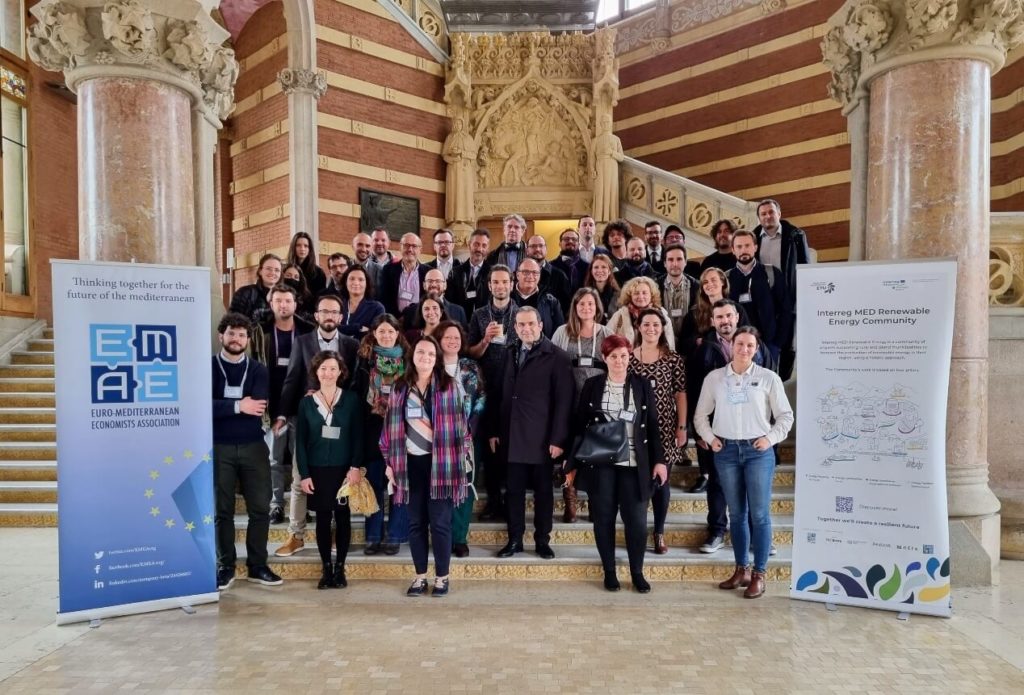
The ETU Initiative Conference brought together communities for a more sustainable Mediterranean region
The ETU Initiative Conference took place in Barcelona on the 16th-17th March 2022, gathering local and regional decision-makers, energy experts, and researchers in the historic Recinte Modernista de Sant Pau Art Noveau Site. The Conference – organised by EMEA on behalf of the Interreg MED Renewable Energy project – was an opportunity to showcase the work done by the project and its nine Flagship Case municipalities, and to develop roadmaps for the renewable energy transition.
The Conference marked the Interreg MED Renewable Energy community’s first in-person event since the start of the COVID-19 pandemic. The two-day event focused on showing how the project’s Ecosystemic Transition Unit (ETU) can support a variety of communities from across the Mediterranean to transition towards renewable energy. Through the work done over the past year by the ETU Initiative Flagship Cases in rural, urban and island areas, participants could grasp how that support can be mainstreamed, and the community’s knowledge transferred.
The Conference began with a keynote panel on the challenges and opportunities for the energy transition in rural and island areas, moderated by Kostas Komninos – Director of the DAFNI Network – and set the ground for the following discussions on the project’s experiences, lessons learnt and useful resources.
The panel’s participants – Grammenos Mastrojeni (Union for the Mediterranean), Julije Domac (FEDARENE), Lisanne Raderschall (Organisation for Economic Cooperation and Development), Jesús Pulido (Spanish Ministry for the Ecological Transition) and Alberto Giaconia (ENEA), highlighted the importance of putting the renewable energy transition at the centre of local and regional planning, and supporting the institutions on the ground to implement new energy systems.
Day one also focused on how to overcome common challenges experienced by participants. The ETU Initiative Flagship Cases of Ragusa (Italy), Onda (Spain), Naxos (Greece) and Brdovec (Croatia) shared their experiences of integrating the ETU tools in their renewable energy planning. The expert panel speakers from EIT Climate-KIC, IREC, Som Energia and the European Crowdfunding Network shared key resources to advance towards better planning, financing, and governance.
The event was also an opportunity to create synergies across projects and initiatives to overcome these common challenges. The parallel sessions on the first day focused on the four pillars of the ETU Initiative: energy planning, energy facilities, energy communities and energy governance and financing. The ETU Flagship Cases as well as other EU-funded projects shared best practices and engaged in lively conversations, sharing experiences and ways to move forward.
The full recording of day one can be followed here:
On the second day, the conference focused on the power of regional integration to overcome common challenges of the energy transition. Rym Ayadi – President of EMEA – opened the second day of the conference with a keynote speech on how to finance the green transition. The following sessions kept the same focus with interventions from regional authorities and international organisations such as UN-Habitat, PRIMA, IEMed, SCP/RAC or the Egyptian Ministry of Planning and Economic Development. The speakers focused on the role of governance and cooperation across the Mediterranean region and Africa, and the power of knowledge transfer to build capacities and boost the green transition in the region.
The full recording of day two can be followed here:
ETU Flagship cases results
The ETU Initiative 2nd Transnational Workshop took place on the 15th of March prior to the ETU Conference. The Workshop brought together the ETU Flagship and Assessment cases from Italy, Greece, Spain and Croatia. The Cases shared their main results and their experiences of participating in the ETU mainstreaming exercise. The workshop was organised in three sessions according to the cases’ focus: energy communities, Sustainable Energy and Climate Action Plans (SECAP), and biomass solutions.
The workshop also aimed to establish partnerships with organisations that may join the ETU Initiative by supporting the ETU Manifesto and signing the Letter of Commitment in the Euro-Mediterranean region.